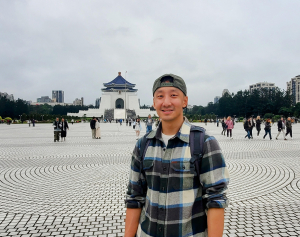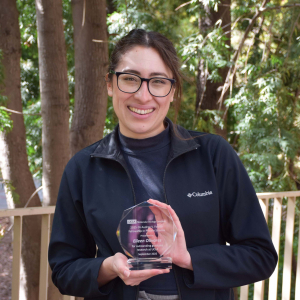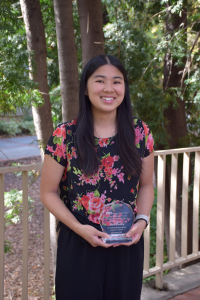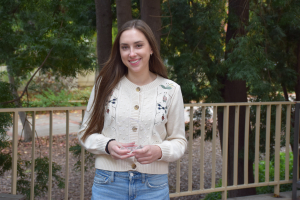2024-2025 Fowler Fellows
 Jonathan Jih is a sixth-year Biochemistry, Biophysics, and Structural Biology (BBSB) Ph.D. candidate in the lab of Dr. Hong Zhou at UCLA. Jonathan earned his B.S. in Microbiology, Immunology, and Molecular Genetics from UCLA, where he became involved in cryoEM research and solved the first atomic structure of a human herpesvirus. Jonathan went on to leverage his cryoEM expertise in academic and industry research consulting.
Jonathan Jih is a sixth-year Biochemistry, Biophysics, and Structural Biology (BBSB) Ph.D. candidate in the lab of Dr. Hong Zhou at UCLA. Jonathan earned his B.S. in Microbiology, Immunology, and Molecular Genetics from UCLA, where he became involved in cryoEM research and solved the first atomic structure of a human herpesvirus. Jonathan went on to leverage his cryoEM expertise in academic and industry research consulting.
At his current post, Jonathan continues to push the frontiers of cryoEM research using machine learning-enhanced techniques to augment structure determination. Jonathan has solved structures of viral intracellular transport machinery enabling human cytomegaloviruses to traffic within host cells, a multi-partite RNA editing complex from the human parasite Trypanosoma brucei, and is currently investigating how double-stranded DNA viruses package enormous genomes into compact, highly-pressurized capsids. In addition to his research activities, Jonathan serves the Southern California cryoEM community by building and maintaining the high performance compute infrastructure at the California Nanosystems Institute.
 Eileen Olivares is a fifth-year Biochemistry, Molecular, and Structural Biology (BMSB) graduate student at UCLA, working in Dr. Joseph Loo’s lab. She earned her B.S. in Biochemistry and M.S. in Healthcare Systems Engineering from Loyola Marymount University (Los Angeles, CA).
Eileen Olivares is a fifth-year Biochemistry, Molecular, and Structural Biology (BMSB) graduate student at UCLA, working in Dr. Joseph Loo’s lab. She earned her B.S. in Biochemistry and M.S. in Healthcare Systems Engineering from Loyola Marymount University (Los Angeles, CA).
Early in her undergraduate career, Eileen worked in Dr. Martina Ramirez’s lab, investigating the genetic diversity of the silver garden spider (Argiope argentata). She later joined Dr. David Moffet’s lab, where she studied the aggregation of islet amyloid polypeptide (IAPP) across species with differing susceptibility to diabetes.
At UCLA, Eileen continues her work on amyloid proteins, developing and optimizing mass spectrometry approaches to characterize a broad range of amyloidogenic proteins—including α-synuclein, amyloid beta, tau, and IAPP—across their monomeric, oligomeric, and fibrillar states. Her research also extends to characterizing therapeutics designed to target these proteins. Ultimately, she aims to use mass spectrometry to advance our understanding of how toxic protein assemblies contribute to disease and how they can be disrupted through therapeutic intervention.
 Nikki Cheung is a fifth year Biochemistry, Biophysics, and Structural Biology (BBSB) graduate student mentored by Prof. Robert Clubb. Prior to UCLA, Nikki earned her B.S in Chemistry from UC Berkeley where she studied the mTORC1 signaling pathway in the lab of Prof. Roberto Zoncu and developed plant-based food alternatives in the lab of Prof. Ricardo San Martin.
Nikki Cheung is a fifth year Biochemistry, Biophysics, and Structural Biology (BBSB) graduate student mentored by Prof. Robert Clubb. Prior to UCLA, Nikki earned her B.S in Chemistry from UC Berkeley where she studied the mTORC1 signaling pathway in the lab of Prof. Roberto Zoncu and developed plant-based food alternatives in the lab of Prof. Ricardo San Martin.
At UCLA, Nikki’s research is focused on characterizing protein-based virulence factors employed by gram-positive bacteria to invade and infect hosts. Her current work investigates how these protein complexes are assembled and anchored to the cell surface, which could inform novel therapeutic strategies to target antimicrobial-resistant pathogens.
 Lily Taylor is a graduate student in the Biochemistry, Molecular and Structural Biology (BMSB) program, working with Professor Jose Rodriguez. Her work aims to determine the native structures and dynamics of viral proteins, providing molecular insights into viral infection mechanisms and guiding the development of antiviral treatments.
Lily Taylor is a graduate student in the Biochemistry, Molecular and Structural Biology (BMSB) program, working with Professor Jose Rodriguez. Her work aims to determine the native structures and dynamics of viral proteins, providing molecular insights into viral infection mechanisms and guiding the development of antiviral treatments.
Previous Fowler Fellows
2024 Eric Pang (S. Clarke/J. Rodriguez lab), Xuelang (Maymay) Mu (Gonen lab), Andrew Goring (Clubb/Loo Lab), Miranda Villanueva (Backus lab)
2023 Cindy Wang (C. Clarke/S. Clarke lab), Alexandra Turmon (Backus lab), Rohith Nagari (Tontonoz lab), Jee Yun Han (Boutros lab)
2022 Declan Evans (Houk lab), Ashley Julio (Backus lab), Alex Stevens (Zhou lab), Cody Gillman (Gonen lab), Troy Lowe (S. Clarke lab)
2021 Weixian Deng (Wohlschlegel/Plath labs), Sean Jiang (Eisenberg lab), Maria Flores (Rodriguez lab), Carter Lantz (Loo lab), Logan Richards (Rodriguez lab)
2020 Jiahui Lu (Eisenberg lab), Callie Glynn (Rodriguez lab), Janine Fu (Loo lab)
2019 David Boyer (Eisenberg lab), John Muroski (Loo lab), Orlando Martinez (Clubb lab)
2018 Michael Hughes (Eisenberg lab), Kanishk Jain (Clarke lab), William Barshop (Wohlschlegel lab), Yuxi Liu (Yeates lab)
2017 Brendan Amer (Clubb lab), Jeffrey Vinokur (Bowie lab), Anna Sahakyan (Plath lab)
2016 Henry Chan (Feigon lab), Smriti Sangwan (Eisenberg lab), Nicholas Woodall (Bowie lab)
2014 Dan McNamara (Yeates lab), Jena Quick-Cleveland (Guo lab), Nicholas Wu (Sun lab)
2013 Alex Jacobitz (Clubb lab), Alexander Patananan (S. Clarke lab), Carly Ferguson (Loo lab)
2012 Benjamin Kuryan (Carey lab), Letian Xie (C. Clarke lab), Anni Zhao (Eisenberg lab)
2011 Timothy Anderson (Clubb lab), Ian Barr (Guo lab), Soohong Kim (Weiss lab)
2010 Zeynep Durer (Reiser lab), Rachel Senturia (Guo lab), Zurita-Lopez (S. Clarke lab)
2009 Luki Goldschmidt (Eisenberg lab), Kristofer Webb (S. Clarke lab), Sheng Yin (Loo lab)
2008 Nathan Joh (Bowie lab), Neil King (Yeates lab)








